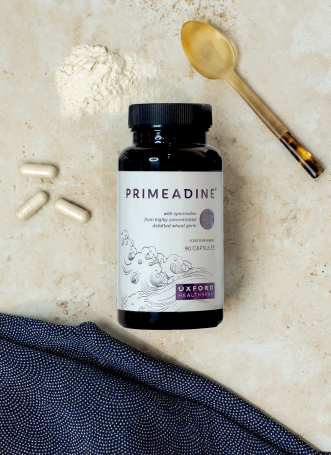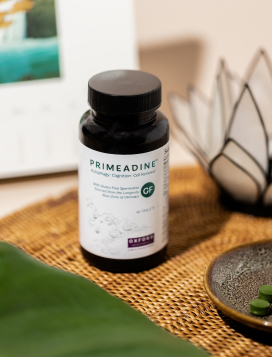ONE WOMAN’S JOURNEY
In Using Science to Defy Age and Disease
At age 39, Leslie Kenny found herself at a crossroads. In the midst of trying to conceive through IVF, she was blindsided by a devastating diagnosis — two autoimmune diseases: rheumatoid arthritis and lupus. Not only did these diseases threaten her dreams of becoming a mother, but they left her life hanging in the balance. A high-powered professional with a scientific mindset, she had expected her doctors to have the answers. But as they told her to accept her fate and manage her decline with immunosuppressants, something inside her refused to surrender. What followed was a personal health revolution.

Every day, she chose to fight to save her own life, exploring new and uncharted ways to, hopefully, elongate her time on this Earth. Leslie pored over research, explored integrative approaches, and embraced radical lifestyle changes
She changed her diet, eliminated inflammatory triggers, took up yoga and hiking, and dove deep into the emerging science of longevity. She also found and used a cutting-edge therapy called Intravenous Immunoglobulin (IVIg), which modulated her immune system back to balance instead of suppressing it. Within six months, she returned to her doctor for routine follow-up, and the impossible had happened — her biomarkers had normalized. She no longer met the criteria for any of the autoimmune diseases. Yet, instead of curiosity and excitement, she was met with indifference.
“The doctor barely looked up from my file,” remembers Leslie, an Oxford-based, Harvard-educated longevity expert and CEO. “I wanted to tell her everything I had done, but she wasn’t interested. That was the moment I realized: our doctors aren’t gods and we patients have more power than we think to change the outcome of our illnesses.”
Now 59 years old, with a biological age of 21 according to cutting-edge testing, Leslie is living proof that lifestyle changes can profoundly impact aging. She attributes her transformation to a combination of dietary changes, movement, stress reduction, and immune system balance — strategies she initially adopted to overcome her autoimmune conditions. Her experience ignited her lifelong passion for understanding how we can slow, and even reverse, the aging process.
Years later, as she continued to refine her approach to longevity, Leslie discovered a breakthrough that would take her understanding of aging to the next level. It was a compound called spermidine—naturally found in certain foods and essential for cellular renewal, immune support, and even cognitive health

Scientists at the University of Oxford had been studying its potential for reversing cellular aging, and the findings were compelling. Studies showed that spermidine could activate autophagy, the body’s natural process of cellular renewal, and target the root causes of aging. Despite its promise, there was no clear path to bringing it to the public — yet. The challenge was bridging the gap between the cutting-edge research and making this compound widely available in a natural, food-derived form. But, just like in her own prognosis of her own life, Leslie saw what others didn’t.
For centuries, women have sought the so-called “Fountain of Youth.” Be it everything from Botox and collagen treatments to trend-driven food and exercise fads, and everything in between, the glitterati of Hollywood and the doyennes up and down Park Avenue are no different. And like the many centuries of those foolish enough to believe in the myth of the Fountain, they often suffer the consequences from such toxic obsessions, resulting in the exact opposite outcome of what they were seeking. Little did they know that the answer to their dreams might have long resided in certain natural foods.
“If this were something our ancestors had been consuming in food for centuries, why weren’t we paying attention?” she said. “People spend fortunes on anti-aging treatments that work from the outside in. This was about restoring vitality from the inside out.”
Determined to make this breakthrough accessible, Leslie founded Oxford Healthspan and introduced Primeadine®, a food-derived spermidine supplement designed to support longevity naturally that’s now expanding into the U.S. from the U.K. Sourced from Japan, home to some of the world’s longest-lived people, Primeadine is made using the highest quality, naturally occurring spermidine from wheat germ, blended with prebiotic fiber to enhance absorption and encourage the body’s own production of spermidine.

The response to the supplement was overwhelmingly positive. Health-conscious consumers, longevity researchers, and wellness experts alike took notice. Users reported improved sleep, enhanced skin and hair health, and sharper cognitive function – and even the reversal of gray hair.
“Think of it like decluttering your house,” Leslie explained. “Autophagy helps clear out damaged cells and allows your body to function optimally. The problem is, as we age, our natural production of spermidine declines. That’s why supplementing with a food-derived source is so powerful. It supports the body’s innate ability to repair and regenerate.”
Leslie is dedicated to longevity education as much as supplementation. Through the not-for-profit Oxford Longevity Project, she collaborates with top researchers, hosts discussions on cutting-edge aging science, and continues to advocate for a holistic approach to health.
“Longevity isn’t about hacking your way to health overnight — it’s about giving your body what it needs, consistently, to thrive,” Leslie said. “When you support the body with the right nutrients, the right lifestyle, and the right mindset, it knows how to heal and renew itself.”
Oxford Healthspan also offers Primeadine® GF, a first-of-its-kind gluten-free formulation with spermidine sourced from Okinawan chlorella and botanicals known for their cellular renewal properties. The original Primeadine is also available in a powdered format for mixing into food or drinks.
For more information on Primeadine and the science of longevity, visit oxfordhealthspan.com





